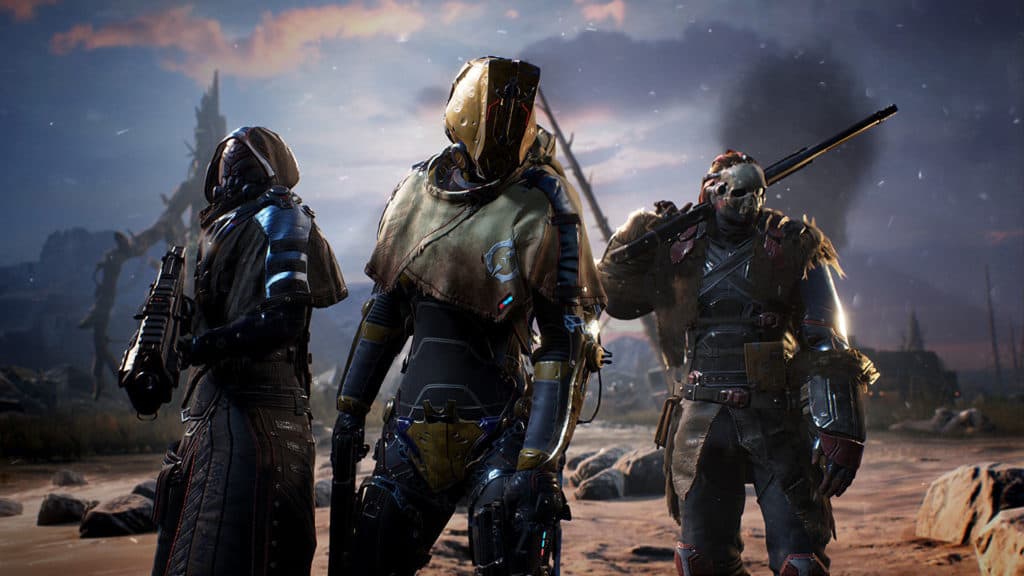Video Gamer is reader-supported. When you buy through links on our site, we may earn an affiliate commission. Prices subject to change. Learn more
I had a very strange experience last night. I attempted to play Outriders. I say “attempted,” because the playing of Outriders involved a number of challenges. First, I was asked to link my Square Enix account to my Xbox profile, which meant scanning a QR code with my phone. (I felt sorry for my camera lens, as it squinted through a cross-eyed haze in order to lock onto its target; I would soon be doing the same.) The revelation of this was that I had a Square Enix account. Then came the game’s atmosphere—or, rather, its various clashing atmospheres. A dragon soaring over a mountain; a lonely-looking planet, blue and ringed; a squad of spacefaring colonisers, clad in rugged uniforms; then, a mutiny, different dimensions, possibly time travel, sci-fi flavoured sorcery, and, to really keep me guessing, an Xbox Live crash.
That last obstacle can hardly be laid at the feet of the developer, People Can Fly, though it does seem to fit the game’s opening. “Persistent interference in the upper atmosphere” is what troubles our colonists—and possibly Microsoft, too—and blights their landing on a distant, Earthy rock. They have been dreaming their way through space, in the cozy depths of hypersleep, for eighty-three years before happening upon a new and fecund planet, called Enoch. Earth, we are told, is dead. “We had destroyed it,” the subtitles tell us, making Enoch “Humanity’s last damn chance.” (Note the use of the word “damn” there, as if the game’s writer, Joshua Rubin, were worried that the appropriate level of planet-ending urgency might not have hit us hard enough.) It isn’t long before our explorers set about reestablishing their old habits. “I bet they can be domesticated, for farming,” says one of the scientists, as a herd of beasts rumbles by. Before an ally offers up a tender alternative: “I bet they make some fat, juicy steaks.”

At this point, I thought I was in for a mash-up: Monster Hunter plus Mass Effect, perhaps, and, to judge from the landscape—green and sweeping, barrelled over by buggies—maybe a pinch of Halo. This was swiftly blown out the window, by the time my character (one of those crusty create-your-own jobs, who appears to be comprised not of flesh and blood but of assets, with their clumpy, depressing shine) had been swept into a wormhole, suffused with magic powers, and sent on a mission to scrounge loot, level up, and crouch behind cover while toting a machine gun—preferably with two co-op companions.
People Can Fly is the studio behind Gears of War: Judgment (whose title always smacked of self-awareness, being the first in the series not made by Epic Games, and thus more open to the scathes of scrutiny). It’s no wonder, then, that the cover shooting has crunch; that your hero’s powers are neatly mapped and easily unleashed; and that the headshots resound with the rind-cracking boom of a bursting watermelon. After an hour or so, I was, sure enough, having fun. But it was the sort of fun that I had to focus on through an awful lot of noise. How odd that a studio of such clear talent and discipline—when not working under the aegis of Microsoft, or saddled with the weight of an established franchise—should opt for a game of such muddled tone and direction: a hodgepodge of hedged bets. Especially when you consider that this is the same developer that brought us such singular, headache-free affairs as Painkiller and Bulletstorm.

Outriders feels like the sort of game that arrives out of breath, having chased various trends through its development. Naturally, Destiny is what lies in publisher Square Enix’s crosshairs, as, indeed, it did for Marvel’s Avengers. But whereas that game’s comic-book vision and adventure felt stretched by the demand for service-game longevity (domesticated, you might say, for farming), Outriders feels oddly focussed by it. In the end, I settled into a snappy groove of stop-and-pop shooting, prising open loot boxes, and scything through foes with a swish of my laser sword (I opted for the Trickster class, one of four on offer, which granted me close-range special moves and the ability to summon a time-clotting bubble of blue light). None of which strikes you as new or interesting, but what it does is soften and defog the hard, bright haze of the game’s plot and premise into something recognisable, even vaguely comforting. You know what it is by bumping into the clichés of its genre. But is that enough? Whether or not People Can Fly has added enough polish and precision to the game’s gears, will come down to personal judgement. From what I’ve played, I can’t say that it gripped me, but I’ll be heading back in tonight with friends, Xbox Live permitting, to give it one last damn chance.

